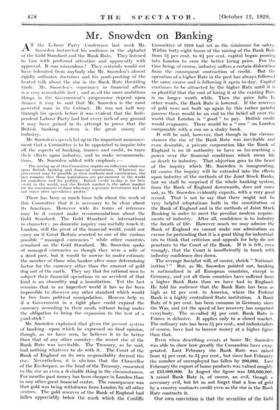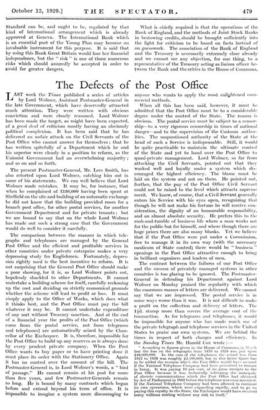Mr. Snowden on Banking
AT the Labour Party Conference last week Mr. Snowden instructed his audience in the alphabet of the Gold Standard and the Bank Rate. They listened to him with profound attention and apparently with approval. It was miraculous ! They certainly would not have tolerated from anybody else Mr. Snowden's almost rigidly orthodox doctrines and his pooh-poohing of the heated talk about the rise in the Bank Rate throttling trade. Mr. Snowden's supremacy in financial affairs is a very remarkable fact ; and as all the more ambitious things in the Government's programme depend upon finance it may be said that Mr. Snowden is the most powerful man in the Cabinet. He was not half way through his speech before it was evident that the Inde- pendent Labour Party had lost every inch of any ground it may have gained in its attempt to prove that the British banking system - is the great enemy of industry.
Mr. Snowden's speech led up to the important announce- ment that a Committee is to be appointed to inquire into all the aspects of banking, finance and credit, to trace their effects upOn industry, and to make recommenda- tions. Mr. Snowden added with emphasis :-
The setting up of this Committee implies no reflection whatever upon British banking and financial institutions. Whatever im- provement may be possible in their methods and constitution, the fact remains that these institutions are pre4)minent in the world for soundness and for probity. British credit to-day is the best credit in the world, and the British market is the safest market for the investments of those who want a genuine investment and do not crave after speculative profits."
There has been so much loose talk about the work of this Committee that it is necessary to be clear 'about its functions. However ,wide its terms of reference May be it cannot make recommendations about the Gold Standard. The Gold Standard is international in character ; no domestic inquiry can usefully touch it. London, still the pivot of the financial world, could not carry on if Great 'Britain resorted to one of the various possible " managed currencies " while other countries remained on the Gold Standard. Mr. Snowden spoke Of managed currencies as though they were a relic of a dead past, but it would be unwise to under- estimate the number of those who hanker after some determining factor for the currency other than- the amount of gold dug out of the earth. They say that for rational men-to subject their financial operations to an accident of that kind is an absurdity and a hurniliation Yet the fact remains that in an imperfect world it has so far been impossible to discover any other standard which would he free from political manipulation. Heaven help its if a Government in a tight place could expand the currency 'according to their needs without being under the obligation to bring the expansion - to the" test of a yard-stick !
Mr. Snowden explained that given the present system of banking—upon which he expresSed no final opinion, though, as we have seen, he believes it to be better than that of any other Country—the recent as Of the Bank Rate was inevitable. The Treasury, as he said, had nothing whatever to do with it. The Court of the Bank of England on its own responsibility decreed the rise. Nevertheless, it is obvious that the Chancellor of the Exchequer, as the head of the Treasury, consented to the rise as even a deSirable thing hi the circumstances. For months past money has been cheaper in London than in any other great financial centre. The consequence was that gold was being withdrawn from London by all other centres. The gold reserves of the Bank of England had fallen appreciably below the mark which the Cunliffe Committee of 1918 had set as the minimum for safety. Within forty-eight hours of the raising of the Bank Rate from 51 per cent. to 6i per cent. capital began pouring into London to earn the better hiring price. For the time being, of course, industry suffers a certain dislocation from the consequent contraction of credit. But the operation of a higher Rate in the past has always followed the same course and is following it again to-day. Capital continues to he attracted by the higher Rate until it is so plentiful that the cost of hiring it at the existing Rate is no longer worth while. Then the price falls. In other words, the Bank Rate is lowered. If the reserves of gold were not built up again by this rather painful process there would be an end to the belief all over the world that London is " good " to pay. British credit would evaporate. There would be a " run " on London comparable with a run on a shaky bank.
It will be said, however, that though in the circum- stances the rise of the Bank Rate was inevitable and even desirable, a private corporation like the Bank of England is no fit authority to have so far-reaching a power over the financial conditions which mean life or death to industry. That objection goes to the heart of the inquiry which Mr. Snowden is inaugurating. Of course the inquiry will be extended into the effects upon industry of the methods of the Joint Stock Banks, but we shall be surprised if the whole banking system, from the Bank of England downwards, does not come out, as Mr. Snowden evidently expects, with a very good record. That is not to say that there might not be very helpful adaptations both in the constitution of the Bank of England and in the methods of Joint Stock Banking in order to meet the peculiar modern require- ments of industry. After all, confidence is to industry the breath of life. However much we may admire the Bank of England we cannot make our admiration an excuse for pretending that it is a good thing for industrial- iSts to think that criticism and appeals for help do not penetrate to the Court of the Bank. If it is felt, even wrongly, that the Court is insufficiently in touch with industry confidence dies down.
The average Socialist will, of course, shriek " National- ization ! " But, as Mr. Snowden pointed out, banking is nationalized in all European countries, except in Germany, and yet all those countries have suffered from a higher Bank Rate than we have had in England.
He told his audience that the Bank Rate has been as high as 12 per cent. in America, where the Federal Bank is a highly centralized State_ institution. A Bank Rate of 9 per cent. has been common in Germany since the War, and yet the speed of her recovery has surprised everybody. The so-called 31 per .cent. Bank Rate in France is delusive. It applies only .to a closed market. The ordinary rate has been 5 per cent., and industrialists of course, have had to borrow money at a higher figure than that.
Even when describing events at home Mr. Snowden was able to show how greatly the Cassandras have exag- gerated. Last February the Bank Rate was raised from 44 per cent. to 54 per cent., but since last February the number of unemployed has fallen by 200,000. Last February the export of home products was valued roughly at t55,000,000. In August the figure was £68,000,000. A raised Bank Rate is, of course, an evil, though a necessary evil, but let us not forget that a loss of gold by a country contracts credit even as the rise in the Bank Rate, contracts it. _ - • Our own conviction is that the severities of the Gold Standard can be, and ought to be, regulated by that kind of international arrangement which is already approved at Geneva. The International Bank which is an essential part of the Young Plan may become an invaluable instrument for this purpose.. It is said that by using this Bank Great Britain would lose her financial independence, but the " risk " is one of those numerous risks which should assuredly be accepted in order to avoid far greater dangers. What is chiefly required is that the operations of the Bank of England, and the methods of Joint Stock Banks in bestowing credits, should be brought sufficiently into the light for criticism to be based on facts instead of on guesswork. The association of the Bank of England and the Treasury is necessarily extremely close already and we cannot see any objection, for one thing, to a representative of the Treasury acting as liaison officer be- tween the Bank and the critics in the House of Commons.









































 Previous page
Previous page